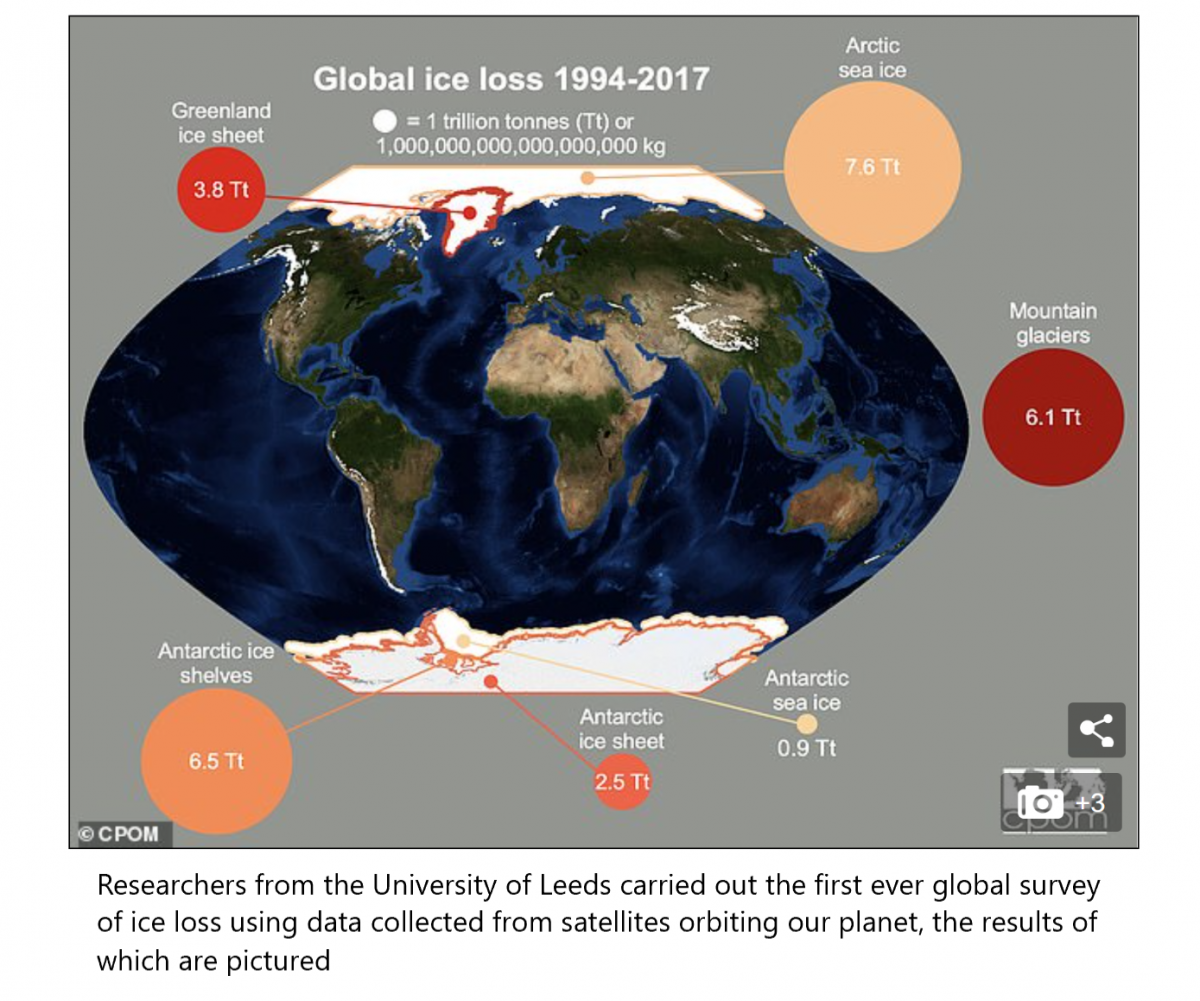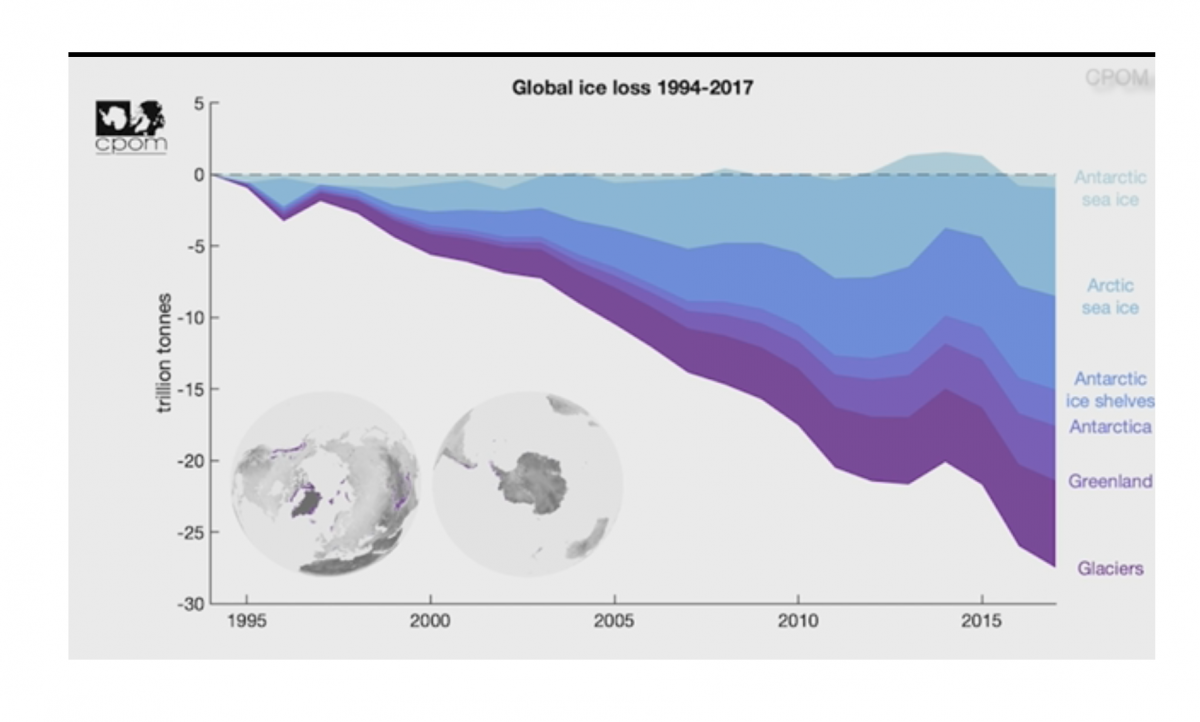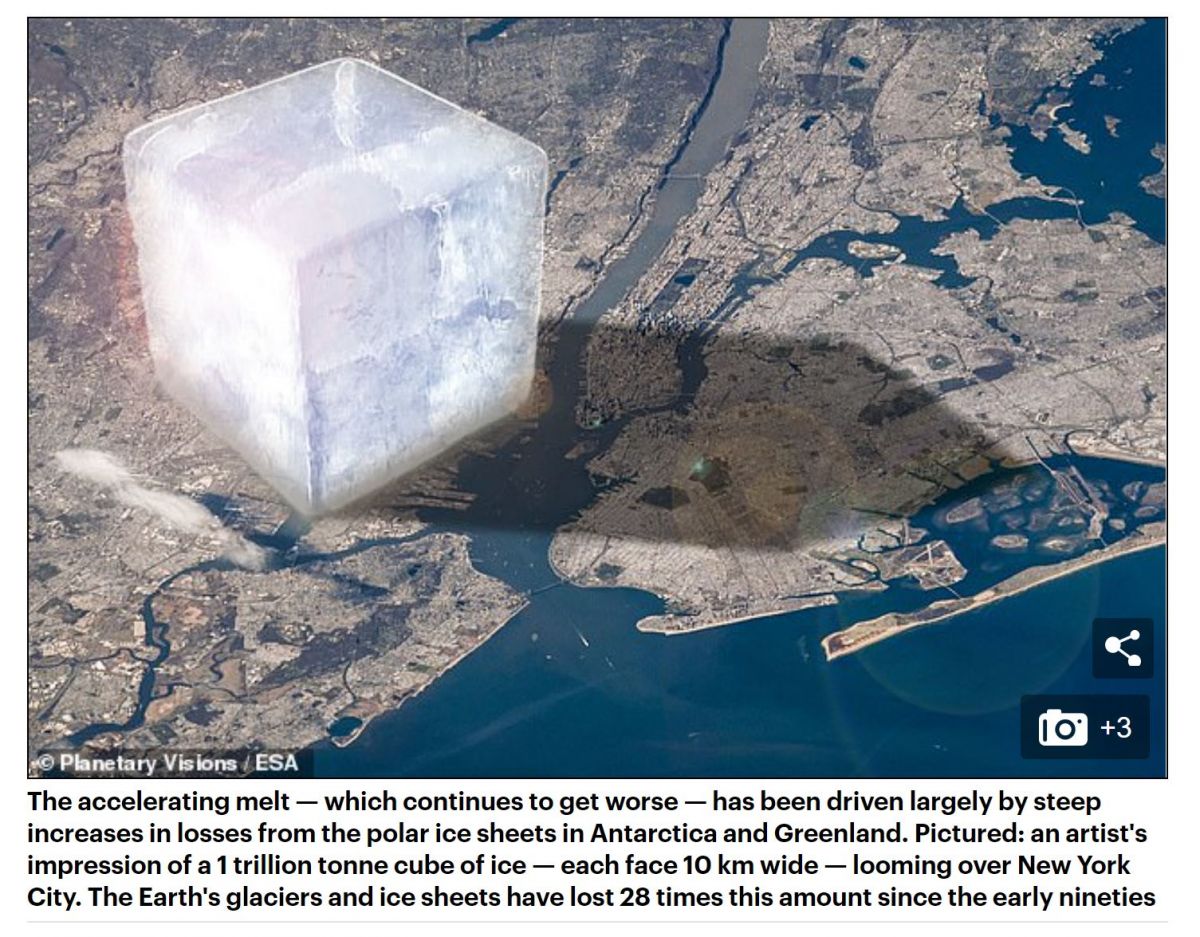January 26, 2021
Earth lost a record 28 TRILLION tonnes of ice between 1994 and 2017 — equivalent to a sheet over 300 feet thick covering the whole of the UK
Experts from the University of Leeds surveyed global ice loss using satellite data. They found the annual rate of ice melt has increased by 65 per cent since 1994. Increases have been mainly driven by losses from the polar ice sheets, they said Melting ice raises sea levels across the globe, threatening people and wildlife.
A record-breaking 28 trillion tonnes of ice — enough to cover the whole of the UK in a sheet over 300 feet thick — melted from the face of the Earth between 1994–2017.
Researchers from the University of Leeds carried out the first ever global survey of ice loss using data collected from satellites orbiting our planet.
The team found that the annual rate of ice loss increased by 65 per cent over the 23-year period — going from 0.8 trillion tons in the nineties up to 1.3 trillion tons.
The accelerating melt — which continues to get worse — has been driven largely by steep increases in losses from the polar ice sheets in Antarctica and Greenland.
 Ice melt serves to raise sea levels across the globe, increases the risk of flooding to coastal communities and endangers natural habitats that wildlife depend upon.
Ice melt serves to raise sea levels across the globe, increases the risk of flooding to coastal communities and endangers natural habitats that wildlife depend upon.
'Although every region we studied lost ice, losses from the Antarctic and Greenland ice sheets have accelerated the most,' said paper author and earth scientist Thomas Slater, of the University of Leeds.
The ice sheets are now following the worst-case climate warming scenarios set out by the Intergovernmental Panel on Climate Change.'
'Sea-level rise on this scale will have very serious impacts on coastal communities this century.'
'Over the past three decades there's been a huge international effort to understand what's happening to individual components in Earth's ice system,' he added.
This endeavour, he explained, has been 'revolutionised by satellites which allow us to routinely monitor the vast and inhospitable regions where ice can be found.'
'Our study is the first to combine these efforts and look at all the ice that is being lost from the entire planet.'
 According to Dr Slater and colleagues, the rising ice loss is due to the warming of Earth's atmosphere and oceans — which have, respectively, seen temperature increases of 0.5°F (0.26°C) and 0.2°F (0.12°C) each decade since the 1980s.
According to Dr Slater and colleagues, the rising ice loss is due to the warming of Earth's atmosphere and oceans — which have, respectively, seen temperature increases of 0.5°F (0.26°C) and 0.2°F (0.12°C) each decade since the 1980s.
The majority — 68 per cent — of global ice loss was driven by atmospheric melting, while the remaining 32 per cent of losses have been driven by oceanic melting.
The team's survey covered 215,000 mountain glaciers spread around the planet, the polar ice sheets in Greenland and Antarctica, the ice shelves floating around Antarctica and sea ice drifting in the Arctic and Southern Oceans.
'Sea ice loss doesn't contribute directly to sea level rise but it does have an indirect influence,' said paper author and earth scientist Isobel Lawrence, also of Leeds.
 'One of the key roles of Arctic sea ice is to reflect solar radiation back into space which helps keep the Arctic cool.'
'One of the key roles of Arctic sea ice is to reflect solar radiation back into space which helps keep the Arctic cool.'
'As the sea ice shrinks, more solar energy is being absorbed by the oceans and atmosphere, causing the Arctic to warm faster than anywhere else on the planet.
'Not only is this speeding up sea ice melt, it's also exacerbating the melting of glaciers and ice sheets which causes sea levels to rise.'
Experts have estimated that for every centimetre of sea level rise, approximately a million people are placed at risk of being displaced from their low-lying homelands.
Despite storing only one per cent of the Earth's total ice volume, glaciers were found to have contributed to almost a quarter of the global ice losses over the study period — with all glacier regions around the world losing ice.
'As well as contributing to global mean sea level rise, mountain glaciers are also critical as a freshwater resource for local communities,' said paper author and climate scientist Inès Otosaka, also of the University of Leeds.
'The retreat of glaciers around the world is therefore of crucial importance at both local and global scales.'
The full findings of the study were published in the journal The Cryosphere.
Sources: